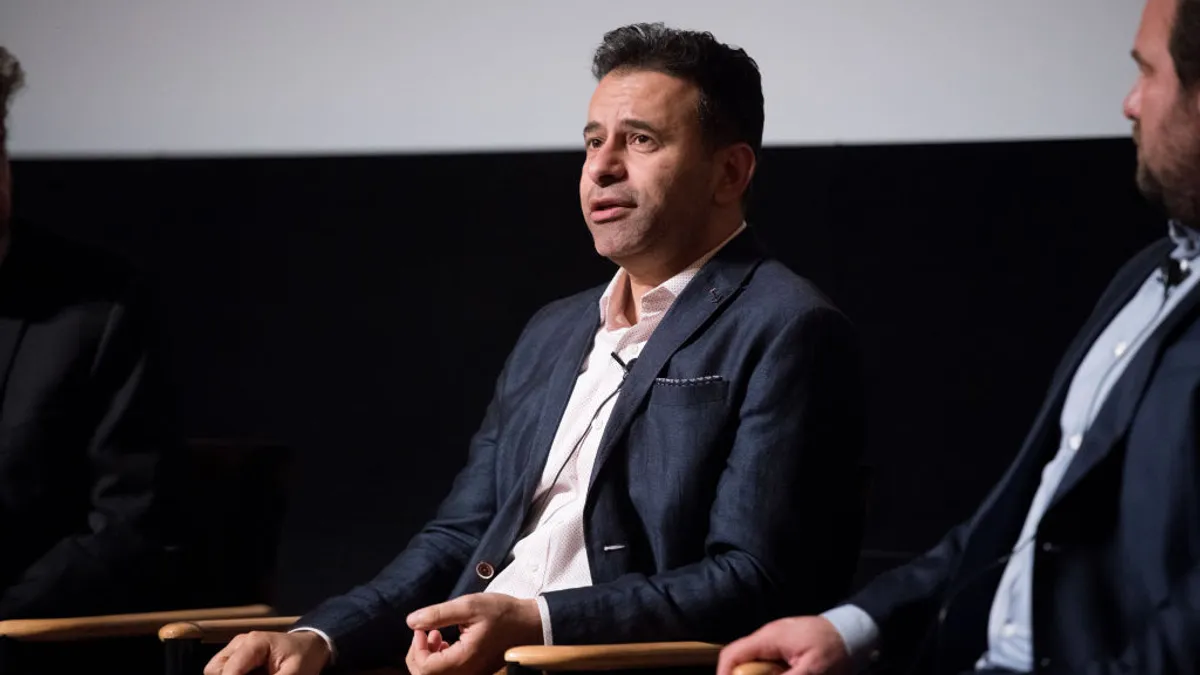Giving Back Through Mentoring By Robin Robinson The PharmaVOICE 100 honorees talk about why being a mentor is important in today’s business environment. Many of our PharmaVOICE 100 honorees credit their mentors for helping them succeed in their own careers, and they participate either in formal or informal mentoring programs. Their reasons for being mentors are as varied as the honorees themselves. Many say being a mentor is important because they want to help others reach their own career objectives. Others say mentoring is a way to pay it forward in recognition of the help they had received in their careers. “Mentoring is vital to my success; from the moment I started working in the industry I have been fortunate to have mentors," says Andrew Burns, executive VP, global head of interactive and corporate development at WorldOne. “These mentors guided and advised me in every major decision as I learned my way. They only asked me to do one thing in return, and that is to pay it forward. Every day, I mentor several individuals; not only does this benefit my colleagues, but it benefits our business." Laura Randa, director, payer marketing, vaccines at GlaxoSmithKline, is another honoree who mentors others as a way to give back. “I have been very fortunate to have many mentors throughout my life; for that reason, I have mentored many," she says. “I truly believe that mentoring is a win-win for everyone. It helps the mentee become more proficient at his or her job, it is good for the mentor to give back by sharing wisdom, and it helps develop well-rounded, knowledgeable professionals." Sharon Presnell, chief technology officer at Organovo, says her life has been touched positively by people who have given her feedback and advice. “I want to pay it forward to the next generation of young women trying to make a place for themselves in a career environment that is becoming more and more competitive," she says. “I am passionate about coaching people to step out of their comfort zones and become confident in bringing their talents to a new role and not be afraid of failure." Other PharmaVOICE 100 honorees say they want to help empower others to take charge of their careers and develop future business leaders, especially women in the life sciences. Joanne Kamens, Ph.D., executive director, Addgene, says she has been mentoring young scientists, especially women, since about 2002. “At one point early on in my career, I realized I had been in meetings all week and there hadn’t been another woman in the room the whole time," she says. “Since my Ph.D. class was about 50% women, I just didn’t understand what had happened to the other women. I am a scientist, so I did some research and was appalled to discover the lack of diversity in science on all fronts and that mentoring was one strategy proving to be effective for minority advancement. Since then, I have done what I can to stem the tide of women dropping out and helping all young scientists have a chance to succeed." Abbe Steel, VP, patient and physician services at UBC, an Express Scripts company, says she is currently mentoring a young female professional within her organization and has been a mentor for several other young women over the years. “I take mentoring seriously because I know how valuable the experience can be," she says. “I encourage women to think outside the confines of their job, and I’ve always stressed the importance of finding their passion and pursuing a path that will bring them both personal and professional fulfillment. We need more women to take the lead, and I want to do everything in my power to help make that happen." Kathy Jo Usher, head of managed markets at Bayer Healthcare Dermatology, takes part in the Women’s Leadership Peer Coaching Program at Bayer. “It is incredibly important to offer our experiences, both good and bad, to help counsel and mentor those we can guide through the various stages of career development," she says. “I’ve learned so much from these tremendous women during our sessions together and hope I have contributed to their career growth." Antony Loebel, M.D., executive VP and chief medical officer at Sunovion Pharmaceuticals Inc., is committed to coaching mentees toward continued professional growth and success. “I am the executive sponsor of an employee professional development initiative at Sunovion that includes a corporate mentorship program," he says. “I regard mentoring as an important professional development strategy to ensure that employees are supported and prepared to take on new challenges. We all face challenges during the course of our careers. I’ve found that sharing the lessons I’ve learned and offering experience-based insights can provide tangible value to the development process of mentees." Guiding the Next Generation Alexandra von Plato, president and global chief creative officer, at Publicis Healthcare Communications Group, says it’s critical to be accessible to younger and mid-level professionals to let them know that if they take risks and contribute that they have an executive champion who will back them up. “I want to be sure that no one in any organization I am associated with feels that there are barriers to succeeding," she says. Ann Mohamadi, managing director, pharmaceuticals and life sciences, at PwC, says she likes to share what she has learned if it has the ability to help others accelerate their learning and success. “Sometimes people underestimate themselves," she says. “It’s important for people to support each other." John Mendlein, Ph.D., executive chairman and CEO at aTyr Pharma, says mentoring is about providing the right feedback to people. “Mentoring can make a huge difference in the business outcomes," he says. “And it can make a huge difference for a person’s career. I try to engage in the right type of conversations with talented people to help their career and help them understand some of the important things related to the industry and, hopefully, this will lead to their benefit as well as to the organization’s benefit." Helping to guide others through career challenges also motivates our honorees. “People have been wonderfully supportive of me and I try to always serve others in the same way," says Robin Winter-Sperry, M.D., president and CEO of Scientific Advantage. “My business has grown out of relationships and a network of colleagues, so I try to share that with others as well. Students are always incredible because they are still formulating their ideals and approach to the world. If I can help someone avoid some of the pitfalls that I’ve fallen into, connect them with others to meet their career goals, then it gives me great personal satisfaction." Marc Sirockman, executive VP, general manager, of Artcraft Health Education, says he has made great decisions and poor ones, and learned on the front lines. “Helping others navigate corporate challenges, political agendas, and visualize connections between ‘words and music’ has resulted in increased confidence to develop their instincts and execute on good plans," he says. Jessica Lea, Pharm.D., president of Tria Health, says she emphasizes the importance of making good business decisions; prioritizing work efforts to meet the goals of the company; giving back to the community; creating a culture of health; education; and making sure to take time off for family." Companies don’t train their employees the way the used to, says Kristin Gross, director for Acurian. “My goal is to offset that by giving guidance whenever the opportunity presents itself," she says. “On the flip side is, when you mentor someone, you can get something in return. It’s the same idea with volunteering: you give your time for someone to help them out and you walk away feeling 10 times better yourself." Punit Dhillon, president, CEO, and co-founder of OncoSec Medical, says it’s important in the pharmaceutical industry to have a mentor. “This industry is super-competitive, we need people who have superior technical and cross-disciplinary experience," he says. “Mentoring is a nice complement that helps make people’s experience more worthwhile, and they can see directly how their education applies in the real world. Mentoring also gives me a sense of fulfillment because I get to transfer my knowledge to others." Kent Thoelke, executive VP for scientific and medical affairs at PRA, says he aims to create an environment through mentoring where people are free to learn and grow. “Being a mentor is about creating an environment where people can ask the types of questions they need and where people feel like it’s safe to learn," he says. “I am a big believer in letting people become the leader they’re going to become. I’m not a huge micromanager. I like to let people run with things and then step in when I see them going off course just to help them course correct. Great leaders become great leaders because they use every part that they have and then they apply it to what they know. That’s how I mentor leaders." Leaving a Legacy Many PharmaVOICE 100 honorees stress that being a mentor is as rewarding for themselves as it is for mentees. Richard Russell, executive VP and chief commercial officer, at Sunovion Pharmaceuticals says being a mentor is one of the most gratifying aspects of his career. “Mentoring provides leaders with the benefit of listening to perspectives," he says. “As I have advanced my career I have found it is extremely gratifying to provide guidance to others and I continue to learn and grow as a leader from this experience." Adrienne Robinson, director, business affairs and alliance management at Merck, says she has mentored many individuals actively throughout her entire career — formally and informally. “It’s really satisfying to help people be their best and I truly get just as much out of the relationship as I give," she says. “I have particularly enjoyed mentoring some of the early talent whom have just started working at Merck. I love their energy and perspective and I find it very refreshing." Jessica Brueggeman, VP, health behavior group at MicroMass Communications, says it’s important for leaders to mentor others. “Mentoring is not only my passion, but I feel it’s my responsibility," she says. “I think a person’s success is measured most by the people they’ve touched along their career journey. I personally feel most successful when I see someone on my team excel." There is great satisfaction in motivating and challenging others, says Matthew Stumm, principal, creative and media Strategy at BBK Worldwide. “I like to teach and push people to think outside of their comfort zone, to look at solving a challenge from a completely different angle," he says. “I like to create an environment where people are comfortable sharing and advancing their ideas. And one day I want to be the guy, the one that others look to as having an impact on their development, because I was fortunate to have those individuals/mentors in my life who contributed to my development." Helen Sabzevari, Ph.D., senior VP of immuno-oncology, global research and early development at EMD Serono, says through mentorship, those in the industry leave a legacy so the field will continue to evolve and scientific advancements will continue long after they are gone. “I believe it is our responsibility as senior scientists to develop the next generation of researchers and clinicians," she says. “Advancing women in science is also of particular interest to me." Walter Capone, chief operating officer at The Multiple Myeloma Research Foundation, says he takes a mentoring approach to managing overall. “The most gratifying experience you can have in working with others is contributing to the development and advancement of those you work with, particularly if they are early in their career development," he says. “If they excel, then you are effective in your role as manager." Matthew West, chief talent officer at McCann Regan Campbell Ward, a division of McCann Health, says mentoring is the most important part of his job and is the primary reason that he set up the agency’s mentorship program. “Successful mentoring pairings are reciprocal relationships, and research shows that mentors benefit as well," he says. “They value having people in the company who are loyal to them. Mentors can gather important information from protégées, such as what’s going on at other levels of the organization, insights into a younger generation, and new perspectives on older challenges. Finally, there is the personal satisfaction of leaving a mark on the next generation of leaders." Johnathan Guarino, executive VP, managed markets and global payer access at Palio+Ignite Managed Markets, says mentoring others is a way to be an agent of change within an organization. Christine Pierre, president of Society for Clinical Research Sites (SCRS), say a leader’s own success can be measured by the positive difference he or she can make on others. “If I am not engaged with others then that can never happen, and therefore I’d feel pretty empty, regardless of what the external picture may look like," she says. “As I have advanced my career I have found it is extremely gratifying to provide guidance to others and I continue to learn and grow as a leader from this experience." Richard Russell / Sunovion Pharmaceuticals “I take mentoring seriously because I know how valuable the experience can be." Abbe steel / UBC “Mentoring can make a huge difference in the business outcomes. And it can make a huge difference for a person’s career. " dr. john mendlein / aTyr Pharma “I truly believe that mentoring is a win-win for everyone. It helps the mentee become more proficient at his or her job, it is good for the mentor to give back by sharing wisdom, and it helps develop well-rounded, knowledgeable professionals." Laura randa / GlaxoSmithKline
An article from












